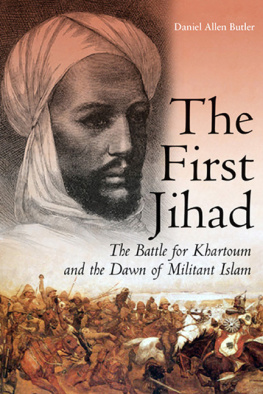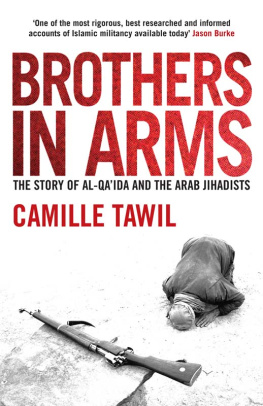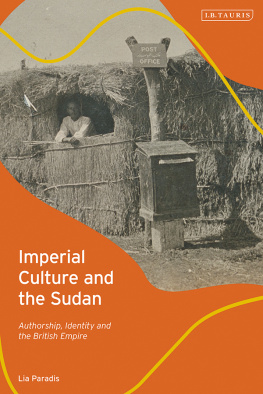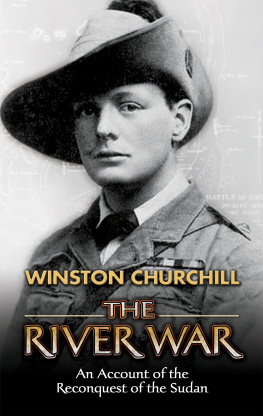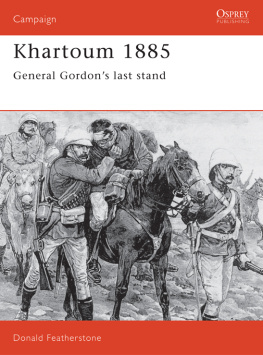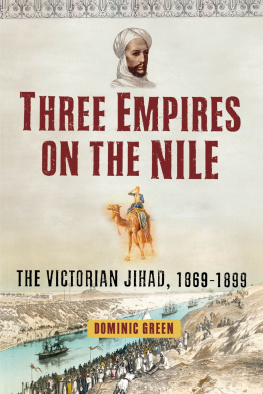AUTHORS NOTE
As curious as it may seem, this book was not written as a reaction or response to the tragedies of September 11, 2001, or subsequent events, although its contemporary relevance is far greater now than I ever imagined it might be when I first gave thought to its writing back in 1999. My lifelong fascination with maritime subjects has been paralleled by an equally abidingand equally deepinterest in military history. I knew of the story of the Mahdi, Gordon, and the siege of Khartoum long before I ever heard of Osama bin Laden or Al Qaeda, and for me it has always been a compelling tale.
But there was always an annoyance, which grew with the passing years, with the excessiveto meemphasis that was always placed on General Charles Gordon, as if he were the only character of any significance or stature in the drama that unfolded at the confluence of the White and Blue Niles. I had always admired Gordon, particularly from the time I had grown up enough to be able to look beyond his obvious heroics and appreciate the underlying character of the man. Though he was frequently portrayed as the stereotypical, two-dimensional Victorian hero, Gordon was simply too big a man to be bound by such conventions, and so the full dimensions of his persona, good and bad, always seemed to emerge no matter what. At the same time, however, the Mahdi was all too often cast in the role of the equally stereotypical, two-dimensional Victorian villian, the requisite bad guy to serve as the necessary foil to Gordon. There seemed to me to be something wrong with this inequity, not because of a commitment to political correctness, which I cordially despise as being intrinsically dishonest, but rather it seemed to me that an individual who couldand didserve as the counterpart to a man of Gordons moral and professional stature had to be someone of equally impressive character. As a consequence, I began looking deeper into the life of Muhammed Ahmed ibn-Abdullahthe Mahdiand discovered an extraordinarily powerful historical figure.
Of course, much of the historical obscurity suffered by the is a direct consequence of the hero-worship that overtook Gordon after the fall of Khartoum at the hands of the Victorian biographers. Gordons death was quickly transformed into a sort of martyrdom and because he was the agent if not the instrument of the Generals demise, the Mahdi was instantly transformed into an incarnation of evil by those same biographers. It little helped his cause that the Mahdi was dark-skinned, belonged to a people who were colonial subjects of the European powers, and practiced a religion that was distinctly non-Christian and even openly hostile to Christianity.
So when I decided that the time had come for a retelling of the story of the siege of Khartoum, I made a determined effort to present a fuller picture of the Mahdi, and to present his rebellion in the light by which he led it, rather than the one it which is was perceived in Europe.
In doing so I discovered that the Mahdi was an extremely interesting individual, quite understandable if not exactly admirable. His ambitions and dreams were the products of his culture and his religion: he was in every way thoroughly Arab and thoroughly Moslem. This latter fact often upsets many of Islams latter-day apologists, who prefer to gloss over their religions violent history and doctrines much the same way Christians prefer to gloss over the Crusades and the European religious wars of the 16th, 17th, and 18th centuries.
In my research I discovered that the Mahdi has his own equivalent of Gordons hero-worshipping biographers: even the most objective lives of the Mahdi written by Arab scholars are more hagiography than responsible biography. While records and documents from the Mahdyyah arent exactly scarce, they are at times sketchy, and not always reliable: there is always the suspicion that some of them may have been altered long ago to please Egyptian and British colonial officialsor more recently to make them acceptable to whichever ruling faction was currently in power in the Sudan.
Consequently, the information available was sometimes ambiguous and frequently contradictory: a considerable mass of information available, but as any good historian will tell you, there is a vast difference between information and knowledge. This made sorting the wheat from the chaff a sometimes formidable project, as the voices of racism and religious prejudice had to be filtered out of both British and Arab documents and sources.
It is with great pleasure then that I am able to acknowledge the assistance of His Excellency Khidir Haroun Ahmed, Ambassador of the Republic of Sudan to the United States, as well as his predecessor, His Excellency Mahdi Ibrahim Muhammed, who were gracious enough to initiate various contacts for me within the Sudan, particularly at the University of Khartoum and the International Islamic University in Khartoum, with which I conducted long and fruitful correspondences. The former Information Attache to the Sudanese Embassy, Mr. Elsadig Bakheit Elfaki Abdalla, was invaluable for his knowledge of just who knew what in his homeland, and who might have answers to specific questions about Sudanese history.
In the United States, Professors John Crossley and Megan Reid, both Assistant Professors of Religion at the University of Southern California, were invaluable for their insights into Islam, its ethics, and its morals, as was Dr. Charles Orr of Westwood Presbyterian Church. Professor Henry Vogt, retired from Hope Colleges Department of Religion, also made significant contributions to my understanding of Islam, its origins and practices. Dr. Maynard Pittendreigh gave me the benefit of his decades of religious scholarship, not only in Christianity but in Islam as well, and often provided intriguing and thought-provoking real-life counterpoint to the sometimes over-idealized perspectives and conclusions of academic religious experts.
The staffs at Hope Colleges Van Wylen Library, the Libraries of the University of Southern California, the Library of Congress, the Imperial War Museum, the British Museum, the British Public Records Office (PRO) and the Scottish National Records Office (SNO) were as always paragons of helpfulness. Deserving particular mention is the staff of the Sudan Archives at the University of Durham, in Durham, England, which possesses one of the most complete collections of both British and Arab correspondence and documents from the period of the Mahdi ever to be brought together in one place; the knowledge of the staff there is as amazing as their collection. All have my heartfelt gratitude for their efforts.
Mention should be made of the photographs and illustrations used in The First Jihad . Ive collected militaria, photos and military artwork for more than a quarter-century, and have accumulated an extraordinary variety of them over the years from other collectors, antique shops, estate sales, and such. Quite a few were acquired while I was in the Army and haunting antique shops in Great Britain while on leave. One packet of photos that apparently dated from the 1930s was simply labeled Khartoum and appeared to be somebodys travel photos; others photos came from old regimental collections that were broken up and sold off. Though I do what I can to save images in my possession, knowing how years of neglect take a toll on many of them I can only imagine what photographic treasures have been lost: thrown into a dustbin, faded to nothing, or allowed to rot and crumble away because no one knew what they were, or cared.
As can be expected, during the research and writing of this book, many of the usual suspects showed up, along with some new faces. Scott Bragg has been, as always, a remarkably reliable resource for rooting out information and contacts through the Internet, as well as providing his own considerable knowledge of comparative religions. Where Trish Eachus found the time to do another one of her excellent proofreadings I have no idea: certainly she had to take time out from her own writing career to do so. She claims that proofreading is therapy for her in her ongoing battle with fibromyalgia, and if that is the case, Im glad to have been of servicecertainly she has done a great service for me! Kitty Bartholomew is at once the most energetic and most level-headed person I know: shes always a morale-booster without peer, and I value her for her common sense as well as her insight. Shes never afraid to simply ask Why? over some point of discussion or conclusion, giving rise to much-needed reality checks as well as ensuring a sound basis for any arguments I may put forward. And no small credit goes to my editor at Casemate, Steve Smith, as well as to my publisher, David Farnsworth, for believing in and supporting this book.

